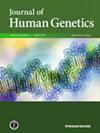Hemizygous SMARCA1 variants cause X-linked intellectual disability
IF 2.5
3区 生物学
Q2 GENETICS & HEREDITY
引用次数: 0
Abstract
Pathogenic SNF2 related chromatin remodeling ATPase 1 (SMARCA1) variants have been reported in patients with X-linked intellectual disability (XLID) characterized by macrocephaly and variable neurological symptoms. Here, we report two unrelated male patients with XLID due to novel SMARCA1 variants detected by exome sequencing. Patient 1 showed macrocephaly, behavioral difficulty, and learning disability with a hemizygous SMARCA1 variant (NM_003069.5:c.1795 C > T p.[Gln599*]) leading to nonsense-mediated decay. Patient 2 had ataxia and speech delay with a hemizygous missense variant (NM_003069.5:c.1343 G > T p.[Arg448Leu]). Structural modeling suggested that the missense variant, p.(Arg448Leu) might destabilize interactions between SMARCA1 and nucleosomal DNA, thereby contributing to the abberant effect of mutant SMARCA1 protein. Both variants were inherited from their unaffected healthy mothers. This study suggests that hemizygous variants impairing SMARCA1 function can cause XLID with other variable features, such as macrocephaly and ataxia, in men.

半合子SMARCA1变异导致x连锁智力残疾。
致病性SNF2相关的染色质重塑ATPase 1 (SMARCA1)变异在以大头畸形和可变神经系统症状为特征的x连锁智力残疾(XLID)患者中有报道。在这里,我们报告了两例不相关的男性XLID患者,由于外显子组测序检测到新的SMARCA1变异。患者1表现为大头畸形、行为困难和学习障碍,伴有半合子SMARCA1变异(NM_003069.5:c)。[1795] C > T p.[Gln599*])导致无义介导的衰变。患者2患有共济失调和语言延迟,并伴有半合子错义变异(NM_003069.5:c)。[3] [G] [G] [j]。结构建模表明,错义变体p.(Arg448Leu)可能破坏SMARCA1与核体DNA之间相互作用的稳定性,从而导致突变型SMARCA1蛋白的异常效应。这两种变异都是从未受影响的健康母亲那里遗传来的。该研究表明,损害SMARCA1功能的半合子变异可导致男性XLID具有其他可变特征,如大头畸形和共济失调。
本文章由计算机程序翻译,如有差异,请以英文原文为准。
求助全文
约1分钟内获得全文
求助全文
来源期刊

Journal of Human Genetics
生物-遗传学
CiteScore
7.20
自引率
0.00%
发文量
101
审稿时长
4-8 weeks
期刊介绍:
The Journal of Human Genetics is an international journal publishing articles on human genetics, including medical genetics and human genome analysis. It covers all aspects of human genetics, including molecular genetics, clinical genetics, behavioral genetics, immunogenetics, pharmacogenomics, population genetics, functional genomics, epigenetics, genetic counseling and gene therapy.
Articles on the following areas are especially welcome: genetic factors of monogenic and complex disorders, genome-wide association studies, genetic epidemiology, cancer genetics, personal genomics, genotype-phenotype relationships and genome diversity.
 求助内容:
求助内容: 应助结果提醒方式:
应助结果提醒方式:


